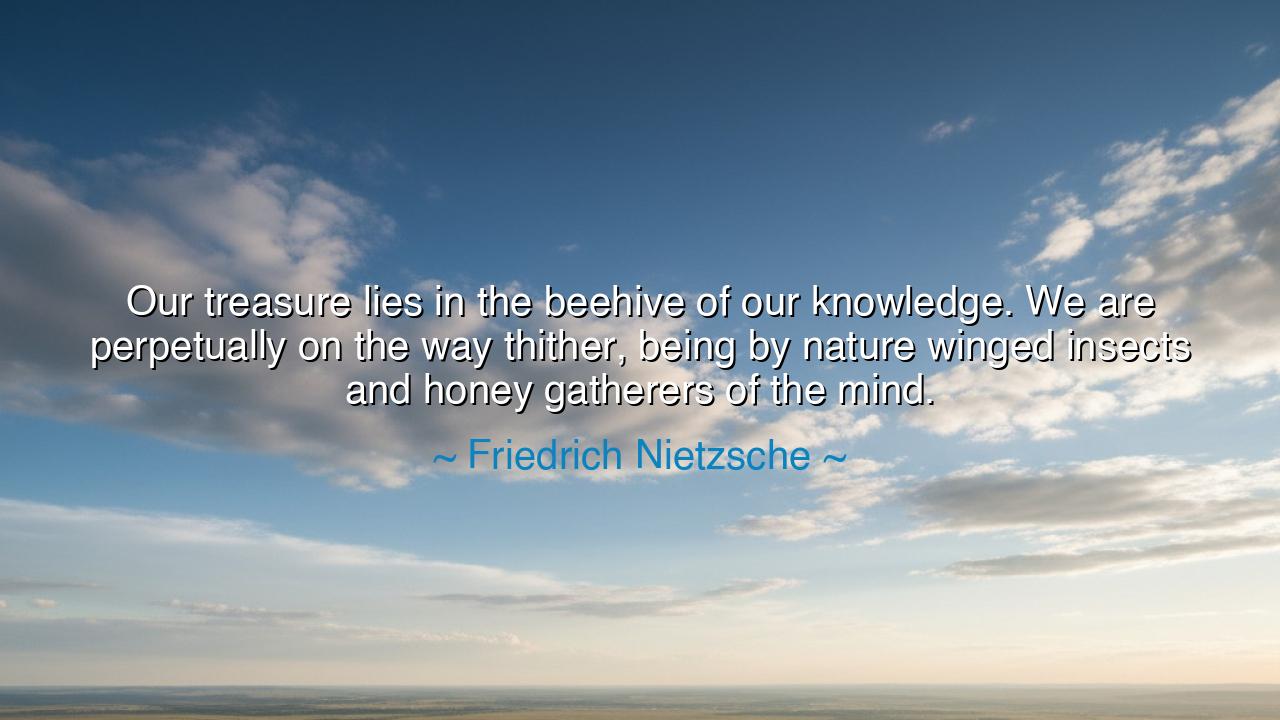
Our treasure lies in the beehive of our knowledge. We are
Our treasure lies in the beehive of our knowledge. We are perpetually on the way thither, being by nature winged insects and honey gatherers of the mind.






“Our treasure lies in the beehive of our knowledge. We are perpetually on the way thither, being by nature winged insects and honey gatherers of the mind.” Thus spoke Friedrich Nietzsche, that storm-born philosopher whose words burn with both the fire of reason and the fever of poetry. In this luminous metaphor, he reveals his vision of the human spirit as a restless seeker — a creature of flight, forever gathering fragments of truth, storing them within the hive of knowledge. For Nietzsche, mankind’s greatest wealth does not lie in gold, power, or possessions, but in the treasure of understanding, distilled drop by drop through experience, reflection, and the eternal striving of thought.
When Nietzsche likens us to honey gatherers of the mind, he is not merely crafting a beautiful image; he is unveiling the very nature of our being. Just as the bee flits from flower to flower, seeking nectar in every corner of the meadow, so too does the human intellect wander through life’s manifold mysteries — drawing sweetness from every question, every sorrow, every wonder. The bee does not know the whole field at once, but through tireless labor, it gathers and builds. So it is with us: we cannot seize truth in a single act of knowing; we must gather, store, and transform the raw nectar of experience into the golden honey of wisdom. Thus, our knowledge is not given but earned — the work of countless flights of curiosity, countless seasons of searching.
Nietzsche’s metaphor also speaks of unity and cooperation, though he seldom used such words lightly. In the beehive, each bee labors alone yet contributes to a greater whole. Each droplet of honey is a result of thousands of tiny efforts, harmonized by an unseen purpose. So it is with humanity. Each thinker, each artist, each seeker adds their own measure of sweetness to the collective hive of human knowledge. The discoveries of the scientist, the visions of the poet, the reflections of the philosopher — all become honey, stored in the great hive of civilization. And though each generation must begin its gathering anew, it inherits this precious store from those who flew before.
We see this truth embodied in the life of Galileo Galilei, who, with his telescope, drew nectar from the stars themselves. For centuries, mankind had looked upon the heavens and believed the earth to be the unmoving center of the universe. But Galileo, that brave bee of the mind, dared to drink from a forbidden flower — to look, to question, and to see. The honey he gathered shattered old beliefs and changed the shape of the human hive forever. Yet, like all who challenge the hive’s comfort, he was stung by his peers. Still, his work endured, enriching the honeycomb of human knowledge for ages to come. From him, and others like him, we learn that gathering truth often demands courage — for to fly freely in search of light is to risk the wrath of darkness.
But Nietzsche’s image carries an even deeper meaning: it is a call to humility. The bee gathers, but it does not possess. The hive belongs not to one, but to all. Likewise, the knowledge we gather is never final, never absolute. The world shifts; the nectar changes; new flowers bloom where old ones fade. Those who imagine themselves to have gathered all honey become stagnant, blind to the infinite field that still lies beyond their sight. True wisdom lies not in hoarding the honey, but in the endless flight — in the joy of the search itself. For the mind that ceases to question ceases to live.
This is why Nietzsche calls us winged insects by nature — not bound to earth, but made for movement. Our wings are our reason, our curiosity, our imagination. We are not meant to dwell in ignorance, nor in comfort, but to wander through the boundless meadows of thought. Every discovery should lift us higher; every doubt should send us flying anew. To live fully is to learn continuously, to taste the world and transform it within. The bee knows no rest except in its labor — so too must the mind find meaning not in idle certainty, but in the eternal dance of inquiry.
So, my children, take this teaching to heart: be diligent gatherers of the mind’s honey. Seek sweetness in every encounter — in books, in nature, in conversation, in silence. Do not fear the sting of failure or the fatigue of flight; they are the price of wisdom. Honor the hive of knowledge built by those before you, but add to it your own drops of understanding. And above all, do not mistake the honey for the journey. The true treasure, as Nietzsche reminds us, is not only the knowledge we collect, but the becoming that happens as we collect it.
For in the end, we are all winged seekers, flying between the flowers of time, gathering light, weaving meaning, and returning, again and again, to the golden hive of the human soul. And though the field of truth is infinite, our joy lies in the pursuit — in knowing that the flight itself is the sweetest nectar of all.






AAdministratorAdministrator
Welcome, honored guests. Please leave a comment, we will respond soon